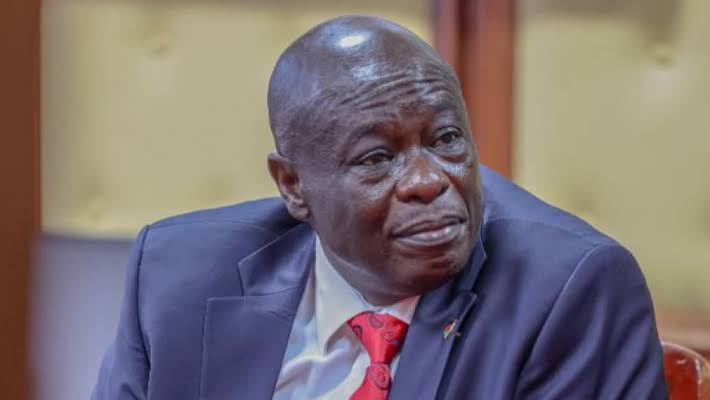Graffiti
OPINION… KENYA: Impeachment and democracy

Democracy is popularly defined as “the government of the people by the people and for the people”. Citizens are at the heart of democracy in that they elect their leaders who then enjoy delegated power from the people. In this sense, by voting for a candidate in an election, the voters delegate their power to the candidate who then if elected by the majority exercises the delegated power on behalf of the people.
The beauty of democracy is the free involvement of the people in periodically electing their leaders at all levels of constitutional governance. The constitution is the key contract between the people and the leaders they elect. Therefore respect for and reference to the constitution is crucial for smooth democratic governance.
While elected leaders who deliver services to the satisfaction of the electorates can be re-elected subject to constitutional term limits, the people through the constitution reserve the sovereign right to recall, impeach or vote out leaders who fail to meet their expectations.
Most democratic constitutions across the world have the recall and impeachment provisions but there are very few instances where they have actually been invoked. This is probably because recall and impeachment are political processes even though they are anchored in law. The easily manipulative politics of recall and impeachment overshadow their constitutional tenents and essence.
In Kenya, the strength and limits of democratic tenets as provided for in the 2010 constitution are being tried and tested. Ugly and unsettling as it may feel, this will ultimately entrench democratic values and principles in the country.
The rule of law, court orders, abuse of power, independent interdependence of the three arms of government, multiparty democracy, public participation, leadership and integrity, constitutional institutions, the sovereign power of the people, provision for impeachment, inalienable human rights, media freedom and freedom of expression are some of the aspects of the 2010 democratic constitution of Kenya that are being tested.
Kenyans stand out in the continent in terms of their active interest, engagement and participation in their political and governance processes. They are great at interrogating what their leaders do. They are alive to the affairs of the nation. All Kenyans and politicians are lawyers someone once said. As politicians, no space is spared from politics and as lawyers, courts are flooded with cases of all kinds.
READ ALSO: OPINION: Kid-hostages and the trial of T-Pain’s regime
Media houses across the continent of Africa and beyond have keenly and rightly so, focused on recent happenings in Kenya with the impeachment of Deputy President Rigathi Gachagua. It was the first scenario in Kenya’s recent history. The event enlivens constitutional provisions and highlights the express desire of Kenyans for accountability and responsibility on the part of political office holders.
We have seen the impeachment of governors and deputy governors at the county level. For the first time the use of impeachment as a constitutional tool is adopted at the national level. If a Deputy President can be impeached, then even the president can be impeached. Senators, Members of Parliament and other elected leaders can equally be recalled.
Everyone now knows this. Hopefully this would in principle help elected leaders to be mindful of their conducts. But would it in reality? If indeed it does, then Kenyans would gain in terms of good governance. It would entrench some political discipline and hygiene.
The fear and big question is whether impeachment as constitutionally provided for is subject to abuses and manipulation? From all indications, yes, it is. Politicians could play politics with impeachment to have their way or to get rid of real or perceived threats or opponents. This calls for sobriety in matters of impeachment to ensure that the tool is not abused or misused.
Lawyers talk about grounds for impeachment meeting the ‘threshold’ established by the constitution. What this threshold means to the constitution and what it means to politicians may be different. Herein lies the need for the judiciary to adjudicate between law and politics.
The judiciary therefore is the final arbiter for ensuring a just, good and smooth constitutional order and democracy. Any failure on the part of the judiciary to secumvent, truncate, manipulate or to be partial would leave the people helpless and the constitution impotent. The judiciary must therefore stand firm at all times on the side of the constitution without fear or favour.
By being truly independent and standing firm on the side of the constitution, the judiciary will give hope and confidence to Kenyans and so safeguard constitution and democracy. Other African countries stand to learn from Kenya’s democratic dispensation.
AUTHOR: Rev Livinus Onogwu, a Nigerian Catholic missionary priest serving in Kenya
Articles published in our Graffiti section are strictly the opinion of the writers and do not represent the views of Ripples Nigeria or its editorial stand.
Join the conversation
Support Ripples Nigeria, hold up solutions journalism
Balanced, fearless journalism driven by data comes at huge financial costs.
As a media platform, we hold leadership accountable and will not trade the right to press freedom and free speech for a piece of cake.
If you like what we do, and are ready to uphold solutions journalism, kindly donate to the Ripples Nigeria cause.
Your support would help to ensure that citizens and institutions continue to have free access to credible and reliable information for societal development.
















